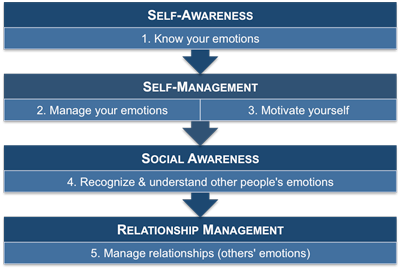Can Emotional Intelligence be Developed?
Probably the biggest factor contributing to the popularity of emotional intelligence theories is the assumption that, unlike IQ, emotional intelligence (emotional quotient) can be developed. There has been some degree of skepticism on this point.
For example, one eminent psychologist recently commented,
'We know a great deal about the origins of personality traits. Traits from all five factors are strongly influenced by genes and are extraordinarily persistent in adulthood. This is likely to be unwelcome news to proponents of emotional intelligence, who have sometimes contrasted a supposed malleability of emotional intelligence with the relative fixity of traditional IQ.'
However, despite this skepticism, there is some evidence that people can improve on emotional intelligence competencies. One study conducted at the Weatherhead School of Management at Case Western Reserve University allowed students to assess their emotional intelligence competencies in addition to cognitive ones, select the specific competencies they would target for development, and develop and implement an individualized learning plan to strengthen those competencies.
Objective assessment of students at the beginning of the program, upon graduation, and again years later on-the-job provided a unique opportunity to help address the issue of whether emotional intelligence competencies can be developed. The results of this research showed that emotional intelligence competencies can be significantly improved, and, moreover, that these improvements are sustainable over time.
This has seen the development of a variety of different models that can measure EI through self-reporting, formal assessment, by testing or using your abilities to identify emotions, within groups and for self-development.
 |
It is the findings of the Weatherhead School of Management research program that have encouraged organizations to invest in developing the four quadrants of EQ that were popularized by Goleman. They have become the de facto standard as far as applying emotional intelligence in the workplace is concerned as shown in the diagram above.
You may also be interested in:
Understanding Emotional Intelligence | Goleman's Model of EI | Emotional Quotient (EQ) and IQ | EQ and Management | EQ Timeline | Personal Competence | Social Competence | EQ Framework.



